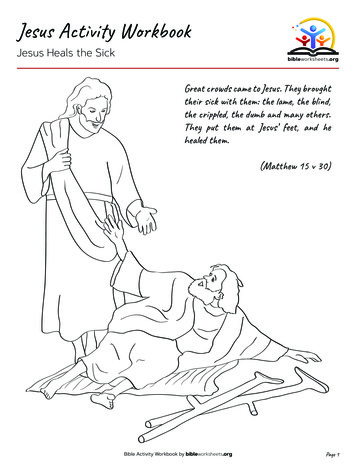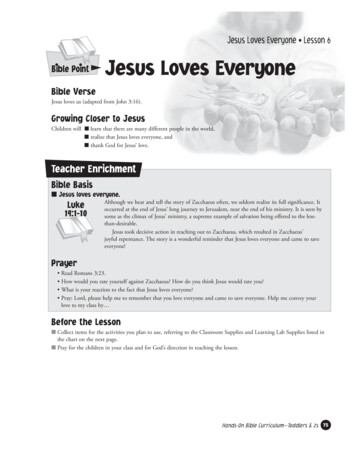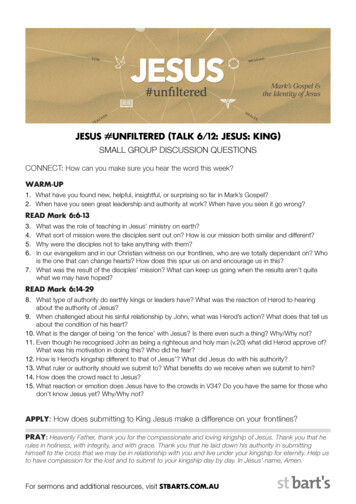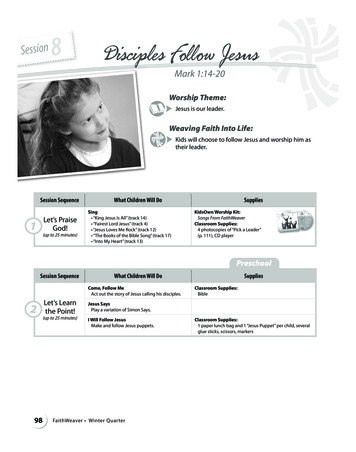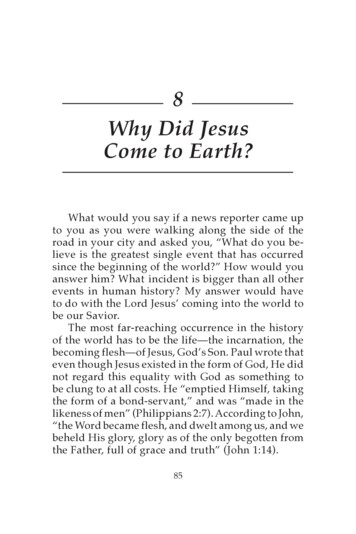
Transcription
WHY DID JESUS COME TO EARTH?858Why Did JesusCome to Earth?What would you say if a news reporter came upto you as you were walking along the side of theroad in your city and asked you, “What do you believe is the greatest single event that has occurredsince the beginning of the world?” How would youanswer him? What incident is bigger than all otherevents in human history? My answer would haveto do with the Lord Jesus’ coming into the world tobe our Savior.The most far-reaching occurrence in the historyof the world has to be the life—the incarnation, thebecoming flesh—of Jesus, God’s Son. Paul wrote thateven though Jesus existed in the form of God, He didnot regard this equality with God as something tobe clung to at all costs. He “emptied Himself, takingthe form of a bond -servant,” and was “made in thelikeness of men” (Philippians 2:7). According to John,“the Word became flesh, and dwelt among us, and webeheld His glory, glory as of the only begotten fromthe Father, full of grace and truth” (John 1:14).85
86INTO THE ABUNDANT LIFEWe could say that Christ was just as much humanas if He were not divine at all, and He was just as muchdivine as if He were not human at all. So completely didJesus identify with the human race in His becomingman that He was born as all humans are born (Luke2:6), grew as all humans grow (Luke 2:40), was subject to all the sufferings to which all humans are heirs(Hebrews 5:8, 9), and lived in a body that could beaffected by disease, decay, and death—a body thathumans could even kill on a cross (Philippians 2:8,9). He was thoroughly a man and was called the Sonof Man, yet He was entirely divine and must be acknowledged as the Son of God (Hebrews 2:14, 17,18). He was the perfect joining of humanity and deity into one personality. He became man withoutsacrificing His deity; He remained divine even thoughHe became like us.The nature of Jesus’ coming to earth raises seriousquestions: Why did Jesus come to earth the way Hedid? What was the purpose of His entering the human race, living among us, and dying upon a cross?Why did the divine Son of God lower Himself to theextent of becoming wholly man? The answers to thesequestions can be summarized in a single sentence:“He came to call out—by His ministry, death, and resur rection—a people for His name whom He would call Hischurch” (Mark 10:45; Luke 19:10).In other words, the result of His visit to this earthis the church. Jesus did not write a book, found acollege, or establish a physical family. The only reality that His earthly ministry produced was the church.The only body Jesus ever said He would build wasa spiritual body which He termed “My church” (Matthew 16:18). The only foundation Jesus laid during
WHY DID JESUS COME TO EARTH?87His ministry was the foundation for the church.Hence, the church can be said to be the singular cre ation of the earthly advent of Christ.AFFIRMED BY THE GOSPELSThis truth is forcefully affirmed by the GospelAccounts. Each of the Gospels points to and leadsup to the church, the kingdom of heaven, that Jesuswould establish on the first Pentecost following Hisdeath and resurrection.As one studies the life of Christ in the Gospels,he is struck by three topics that spring up about Hisministry: (1) the mission He set out to accomplish,(2) the way His work prepared for something more,and (3) the way His work was to continue.First, the Gospels indicate that Jesus did not set outto evangelize the world during His personal ministry.After choosing His apostles, He did not give them aspecial worldwide commission for their preaching;rather, He calmed their zeal by saying, “Do not goin the way of the Gentiles, and do not enter any cityof the Samaritans; but rather go to the lost sheep ofthe house of Israel” (Matthew 10:5b, 6). To our amazement, during His ministry Jesus limited Himself toPalestine. He never went to the countries outside ofthe Roman world. His mission was accomplished byHis preaching and teaching in a very small area ofthe world. Had Jesus set out to evangelize the worldduring His personal ministry, He would have goneabout His work in an entirely different way, employing different wide-scale strategies and methods.Second, the Gospels indicate that Jesus’ life, works,and death were preparing for something to come. Jesuspreached, “Repent, for the kingdom of heaven is at
88INTO THE ABUNDANT LIFEhand” (Matthew 4:17b). He taught His disciples topray, “Your kingdom come” (Matthew 6:10a). Jesuswas careful to prevent the crowds from being overwhelmed by His miracles and, in reaction, rallyingbehind the idea of making Him their earthly king.He did not allow the multitudes of people to dictateHis schedule. When He worked a miracle, Jesussometimes asked the recipient of the miracle to “tellno one” (Matthew 8:4). 1 He chose twelve apostlesand personally trained them, but it is apparent thatHe was training them for the work that they woulddo after His departure (John 14:19).Third, the Gospels picture Jesus’ ministry as havinga sense of incompleteness about it. Jesus did what theFather had sent Him to do; but at the end of His lifeon earth, He prepared His apostles to expect otherevents and revelations following His ascension. Jesussaid to the apostles, “But the Helper, the Holy Spirit, whom the Father will send in My name, He willteach you all things, and bring to your remembranceall that I said to you” (John 14:26). He also told them,“But when He, the Spirit of truth, comes, He willguide you into all the truth; for He will not speak onHis own initiative, but whatever He hears, He willSee also Matthew 9:30; 12:16; 17:9; Mark 1:44; 3:12; 5:43; 7:36;8:30; 9:9; Luke 4:41; 8:56; 9:21. J. W. McGarvey wrote concerning thestrange command “tell no one”: “It is accounted for by the necessity ofguarding against such undue excitement among the people as mighthave provoked an interference from the military authorities, and suchas would have rendered the people incapable of calm thought in reference to the teachings of Jesus. (See also Mark 1:45.) Sometimes, asoccasion required, he reversed his course, and commanded men to gotell what he had done for them” (J. W. McGarvey, The New TestamentCommentary: Matthew and Mark [N.p., 1875; reprint, Delight, Ark.:Gospel Light Publishing Co., n.d.], 75).1
WHY DID JESUS COME TO EARTH?89speak; and He will disclose to you what is to come”(John 16:13). After the Resurrection and just beforethe Ascension, Jesus commanded His apostles to waitin Jerusalem until they received power from on high.Following the recep tion of power, they were to preachrepentance and remission of sins to all nations, starting in Jerusalem (Luke 24:46–49).These characteristics of our Lord’s ministry beforeand after His death clearly show that His ministryon earth was that of bringing together the essentialelements for the building of His kingdom, the church.In Matthew 16:18 Jesus announced to His disciplesthe burden of His earthly work: “I also say to youthat you are Peter, and upon this rock I will buildMy church; and the gates of Hades will not overpower it.” Jesus did not come to preach the gospel; Hecame so that there might be a gospel to preach.The famous sculptor Gutzon Borglum, who chiselled out the remarkable Mount Rushmore in SouthDakota, also sculptured a head of Abraham Lincolnfor the Capitol in Washington, D.C. He carved it froma block of marble in his studio. It is said that whenthe woman who came in each morning to clean hisstudio saw the lifelike sculpture for the first time,she stood in astonishment for a moment and thenasked, “How did he know that Lincoln was lockedin that block of stone?” The answer to her questionis that Borglum could see what others could not. Hehad the eye of an artist, the perception of a sculptor.He could see the face in the block before his skilledhands and visionary mind brought it out.With the aid of the Gospels, we can see what Jesussaw during His earthly ministry. Locked up in Hisministry was the vision of and preparation for the
90INTO THE ABUNDANT LIFEcoming kingdom. He preached about it, prepared forit, and purchased it with His blood.CONFIRMED BY ACTSThe New Testament book of Acts confirms thatJesus’ ministry, death, and resurrection had behindthem the controlling purpose of creating the church,of bringing in the kingdom. The Gospels candidlyannounce the truth, and Acts confirms the announcement by living-color illustrations.Ten days after our Lord’s ascension, the HolySpirit was miraculously given to the apostles on Pentecost (Acts 2:1–4); the gospel of the death, burial,and resurrection of Jesus was preached for the firsttime; people were invited to respond to this gospelby faith, repentance, and baptism for the forgivenessof their sins (Acts 2:38; Luke 24:46, 47); and threethousand accepted that invitation by receiving theWord which was preached and by being baptized(Acts 2:41). Therefore, following Jesus’ ministry asnight follows day, the church of our Lord was born.The remaining story of Acts is the story of thechurch’s moving, as a flame of sacred love, fromJerusalem to Judea and Samaria and beyond, toother parts of the Roman Empire. Whenever inspiredpreaching occurred in Acts, hearers responded, coming into the church by obeying the Word preached.Whenever a mission trip took place in Acts, churcheswere left in its wake in new areas of the world. Thethree missionary trips of Paul in Acts planted churches throughout the world, from Jeru salem to Illyricum(Romans 15:19). No one can read Acts without observing anew the overwhelming conclusion that thechurch is the outcome of Christ’s earthly advent.
WHY DID JESUS COME TO EARTH?91A preacher once said, “We must employ the samemethods that Jesus employed in our task of evangelizing the world. Let us gather around us twelve menand train them for future work. Jesus shows us howto evangelize the world in the method He used.”Certainly, Jesus was perfect in everything He did. Athorough study of His ministry, however, reveals thatHis mission during His ministry was not that ofevangelizing the world. It was that of laying thefoundation for the church; it was that of putting thepieces of the blueprint together for the evangelization of the world. In His approach to His work, Heemployed ways and means suitable for the fulfillmentof His unique mission, a mis sion which was differentfrom the worldwide evan gel istic mission He hasgiven to His followers.We do not see in Acts that the apostles and otherinspired men used the same approaches that our Lordused. They did not try to imitate His way of teaching,gathering around them twelve other men to train.Instead, through their preaching and teaching, theapostles and other inspired men brought people intothe church. These new Christians were then nurtured,trained, encouraged, and taught for service andevangelism by the church as a part of the church. Actsshows us the life of the church as the outcome of theearthly ministry of Jesus. The life of Christ makes up48 percent of the New Testament; the other 52 percentis composed of what the life, death, and resurrectionof Christ produced—the church.REAFFIRMED BY THE EPISTLESThe New Testament epistles stress the applicationof the truth that the church is the natural fruition of
92INTO THE ABUNDANT LIFEChrist’s earthly life and death. The Gospels assertthis truth, Acts amplifies it, and the Epistles applyit. The Epistles show us how to respond to the life ofChrist by being His spiritual body.The Epistles were written to people who hadchosen to come to Christ through faith and obedience.They lived at a time when the effect of Christ’s life,death, and resurrection was in fresh focus. The importof the messages of the inspired men was that Christis honored as Lord and His human life among us isproperly received by our becoming and being Hischurch.In every epistle the followers of Christ are urgedto live and serve as Christ’s spiritual body. TheEpistles, when brought together, actually provide a“guidance manual” on how to be and live as thechurch of Christ in all kinds of circumstances and indifferent places. They teach us how to apply Christ’searthly ministry to our lives.We submit to Jesus as Lord by entering His bodythrough obedient faith. Paul likened the final act of thisfaith response to putting on, or being clothed with,Christ (Galatians 3:27). According to the Epistles, noone has submitted to Jesus until he has entered Hisbody through a baptism for salvation that has beenpreceded by faith, repentance, and confession ofJesus as God’s Son.We honor the life, death, and resurrection of Jesus byliving and worshiping together as God’s family in Hisspiritual body, the church. Paul said,There is neither Jew nor Greek, there is neither slavenor free man, there is neither male nor female; foryou are all one in Christ Jesus (Galatians 3:28).
WHY DID JESUS COME TO EARTH?93For just as we have many members in one body andall the members do not have the same function, sowe, who are many, are one body in Christ, and individually members one of another (Romans 12:4,5). . . there may be no division in the body, but thatthe members may have the same care for one another. And if one member suffers, all the memberssuffer with it; if one member is honored, all themembers rejoice with it.Now you are Christ’s body, and individuallymembers of it (1 Corinthians 12:25–27).On the first day of the week, when we weregathered together to break bread, Paul began talkingto them . . . (Acts 20:7).When we fail to live and worship as God’s family,as Christ’s church, we take away from what Christcame to accomplish and damage what He died toestablish.Jesus has called us to be His body, His church. TheEpistles never describe His people as being any churchor body other than the church of Christ. Accordingto the Epistles, Jesus created only one way for us tofollow Him, only one way to serve Him, only oneway to receive His blood and the salvation He provides. That way is to live faithfully in this world asHis spiritual body.A little girl found a Bible in the corner of the house.She held it up and asked her mother, “What book isthis, Mother?” Her mother said, “That is God’s book,the Bible.” The little girl, with piercing insight, advised, “Why don’t we send it back to Him, since wenever use it?”
94INTO THE ABUNDANT LIFEThe truth is that we can read it and still not reallyuse it. We can quote the Bible in every con versation,read it every day, and yet fail to apply it. Real application of the Bible requires us to follow it in the practical way of being Christ’s church. When we becomewhat the Bible teaches us to become, only then arewe making the right and proper use of it.CONCLUSIONThe entire New Testament, therefore, joins together to teach that the church, the spiritual body ofChrist, is the creation of Christ’s mission in becomingman. The Gospels affirm it by promising it, Actsconfirms it by picturing it, and the Epistles reaffirmit by practically applying it to life.Since the New Testament says that the only wayfor us to respond to the One who lived, died, andarose from the dead for our salvation is by enteringHis church and living as faithful members of it, thequestion that follows is this: “Are you in His body?”What a mistake it would be to come to the end of lifeand discover that you had completely missed thetrue purpose of life! Perhaps there is something evensadder—missing the purpose for which the Son ofGod came to this earth. As surely as the New Testament gives us God’s divine message of salvation, assurely as Christ came to this earth in human form,anyone who does not enter His body will learn at theend of life’s journey that he has missed the reasonwhy Christ came to this earth. This conclusion is thebasic teaching of the entire New Testament!When Christ came to the end of His brief life here,He could say, “Father, I have done what You askedMe to do. I have fulfilled Your mission for Me.” Bet-
WHY DID JESUS COME TO EARTH?95ter it is to live a few years on this earth within thecircle of God’s will, fulfilling His purposes, than tolive a long life in a palace, reigning over the kingdomof selfish pursuits. At the end of life, scores of peopleare only able to say, “God, I have lived out the yearsthat You gave me on this earth, and I have done onlywhat I have wished to do. I have pursued the mission I chose for myself.”May it be that when we come to the close of life,we can say, “Lord, I have discovered from the Scriptures what You wanted me to be and do, and I havededicated myself to that mission. I have sincerelytried to glorify You on the earth, and I have soughtto live the plan that You gave to me. I have lived asthe church of Christ.”STUDY QUESTIONS(answers on page 264)1. What is the greatest event that has ever occurred in thehistory of the world? Give a reason for your answer.2. Was Jesus completely man or just partially man?3. Was Jesus completely divine or just partially divine?4. Why did Jesus come to earth? What one purpose did Hecome to fulfill?5. Show how Jesus’ ministry was preparation for somethingto come.6. What is the function of the Epistles in the New Testament?7. Can we respond properly to the life of Jesus without beingHis church?8. Can we fulfill Jesus’ mission for us in this world withoutliving as His church?
96INTO THE ABUNDANT LIFEWORD HELPSadded to the church—made part of God’s obedient people. Allwho obey the terms laid down by Jesus in the Great Commission are added by God to the body of the saved (Acts2:41, 47).church of Christ—not a building, but the group of those whohave obeyed the gospel and have been added to the church(as in Acts 2:36–47).epistle—a letter. Many New Testament books (Romans throughRevelation) were written as letters to Christians.evangelism—the practice of sharing the gospel. Timothy, forexample, was told to do the work of an evangelist in2 Timothy 4:5.Gentile—a non-Jewish person.Jewish—of the race of Jews, or Israelites; being a descendantof Abraham through Jacob.kingdom of God—the reign and rule of Jesus in the hearts andlives of men.righteousness—the nature of being without guilt or sin. Sincethis is impossible for man himself, being “right eous” meansreceiving the forgiveness of God and becoming justified,cleansed of all sin, before God. The Christian exhibits thisright relationship with God through living daily accordingto His Word.
college, or establish a physical family. The only real-ity that His earthly ministry produced was the church. The only body Jesus ever said He would build was a spiritual body which He termed "My church" (Mat-thew 16:18). The only foundation Jesus laid during . WHY DID JESUS COME TO EARTH? 87 His ministry was the foundation for the church. Hence, the church can be said to be the singular .
